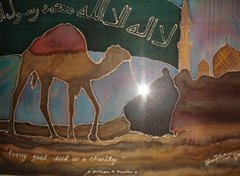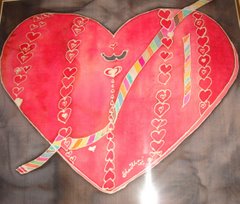
saw-2
The Names and Titles of the Prophet MuhammadThe Prophet (SAW) has been called by many names and titles in the Qur`aan and Sunnah, each one of them describing a special quality of this exalted personality. And in understanding them and reflecting upon them, we can, by the permission of Allaah, increase in our love and following of the Messenger of Allaah (SAW). This discussion is taken from ‘Zaad al-Ma`aad’ (1/88-97) of ibn al-Qayyim, may Allah have mercy on him, summarised.
The names of the Prophet are of two types:
1.Those names that are specific to him and none of the Messengers before him had these names, like Muhammad, Ahmad, al-Aaqib, al-Haashir, al-Muqaffee and Nabi al-Malhama.
2.Those names and qualities that are not specific to him, and were shared by the Messengers before him, but are found in him in the most complete and perfect forms. Like: Messenger of Allaah, His Prophet, His Servant, Prophet of Mercy etc.Through my research I have found that there are a lot of different lists of the Prophet Muhammad’s names that happen to be inauthentic and endorsed by mostly Sufi followers.
The most commonly propagated list of the Prophet’s names are the 99 Names, of which they have likened to the number of names of Allah that He has mentioned (He is not limited only to a certain number of names and attributes). This claim was refuted by Shaykh ‘Ali A. Al-Jumu’ah and stated that it “is not substantiated by any authentic hadîth related from the Prophet (saw ).” Ibn Dahiyyah writes in his book devoted to the prophetic names: “Some people said that the Prophet’s (saw ) names are equivalent to Allah’s names (i.e., 99 names)... "If someone were to search for them, he would find them to be more like three hundred names.” is not substantiated by any authentic hadîth related from the Prophet (saw ).
There are ahadith that state his names like in the hadîth related by Jubayr b. Mut`im that the Prophet said: “I have five names: I am Muhammad, I am Ahmad, I am al-Mâhî for Allah eliminates disbelief by me, I am al-Hâshir since all people gather under me at the day of Judgment, and I am al-`Âqib”. Other names have also been specifically mentioned in the Qur’an as referenced below.
There are ahadith that state his names like in the hadîth related by Jubayr b. Mut`im that the Prophet said: “I have five names: I am Muhammad, I am Ahmad, I am al-Mâhî for Allah eliminates disbelief by me, I am al-Hâshir since all people gather under me at the day of Judgment, and I am al-`Âqib”. Other names have also been specifically mentioned in the Qur’an as referenced below.
Some of the authentic names that can be sourced are the following:
Muhammad: It is a passive participle, which means “to be eternally praised” and has qualities that are praiseworthy. It was given to him by his beloved grandfather, Abdul-Muttalib and it was not a common name at that time. The Prophet Muhammad is praised more than any other person, and this is why - and Allaah knows best - he was called by this name in the Torah, due to the many praiseworthy qualities which he, his religion, and his nation possess such that even Moses wished that he would be from them.
Ahmad: Derived, as is Muhammad, from the noun hamd (praise). A group of scholars said that it is a passive participle, meaning: his praising of Allaah is more than any other person’s praise of Him, and therefore he is the most deserving of being praised and the first. So in meaning Ahmad is similar to Muhammad except that the distinction is that he is Muhammad due to his possessing many praiseworthy qualities, and he is Ahmad due to his being praised in a more excellent way than the praise of any other. And this is the most complete meaning of this word, and the most extensive in commending him (SAW).
Also these two names stem from his character and the praiseworthy qualities that are specific to him, and it is because of these that he is called Muhammad (SAW) and Ahmad. And he is the one who is praised by the People of the Heaven, the People of the earth, the People of the world and the People of the Hereafter.
Al-Mutawakkil: (The One who puts his trust in Allaah). In the Saheeh of Bukhaaree from the hadeeth of Abdullaah bin Umru who said, "I read the description of the Prophet in the Torah: Muhammad is Messenger of Allaah, My servant and Messenger, I have called him al-Mutawakkil. He is neither rude nor harsh and he does not shout in the markets, and he does not return an evil for an evil, rather he overlooks and forgives. And I will not make him to die until I make firm the nation through him, causing them to say: there is none worthy of worship except Allaah."He is the most deserving of this name, because the trust he put in Allaah to establish the religion was a trust unequalled by any other.
Al-Maahee: (the destroyer/effacer). This has been explained in the hadeeth of Jubair bin Mut`am: "al-Maahee: the one through whom Allaah destroys and effaces unbelief." Disbelief was not destroyed and removed by any single person as completely as was done by the Prophet (SAW). Indeed he was sent with the Truth, while all of the inhabitants of the earth were in disbelief, except for some remnants of the People of the Book. They consisted of the worshippers of idols, the Jews who had the Anger of Allaah on them, the Christians who had been misguided, the atheist Saabi`een, the worshippers of the stars and the fire, and the philosophers who did not acknowledge the laws of the Prophets. And Allaah effaced them all through His Messenger until He established His religion and made it supreme over all others, and made it spread to the extent that the night and day spreads, and made his call as the rays of the sun in the various lands.
Al-Haashir: (the Gatherer). He is the one who gathered and united the people at his feet, and therefore it was as if he had been sent for this purpose. The Prophet Muhammad has also been given by Allah the permission to intercede on the behalf of his followers so that they may enter Paradise. In an authentic hadeeth, it was narrated from Abu Hurayrah (may Allaah be pleased with him) that the Messenger of Allaah said: “I will be the leader of mankind on the Day of Resurrection.
Do you know why that is? Allaah will gather mankind, the first and the last of them, in one place, so that the caller will be able to make them all hear his voice and the watcher will be able to see them all. The sun will be brought close and the people will suffer such distress and trouble that they will not be able to bear it or stand it. The people will say, ‘Don't you see in the state you are in and the condition you have reached? Why don't you look for someone who can intercede for you with your Lord?’ The people will say to one another: ‘Go to your father, Adam.’ So they will go to Adam (peace be upon him) …
I [Prophet Muhammad] will go and prostrate beneath the Throne. Then I will be given words of praise such have never been given to anyone before me, then it will be said, ‘O Muhammad! Raise your head; ask, for it will be given to you, and intercede, for your intercession will be accepted.’ I will raise my head and say, ‘My ummah, O lord! My ummah, O Lord!’ It will be said, ‘O Muhammad, admit from among your ummah those who will not be brought to account from the right-hand gate of Paradise, and they will share the other gates with the people.’ He said, By the One in Whose hand is my soul, the distance between two of the gate-posts is like the distance between Makkah and Humayr, or between Makkah and Busra.”
This also shows us how the Prophet’s compassion is towards his followers and to all Muslims. Not only does this increase our love for him, but it also makes us want to follow his Sunnah as best as we could.


